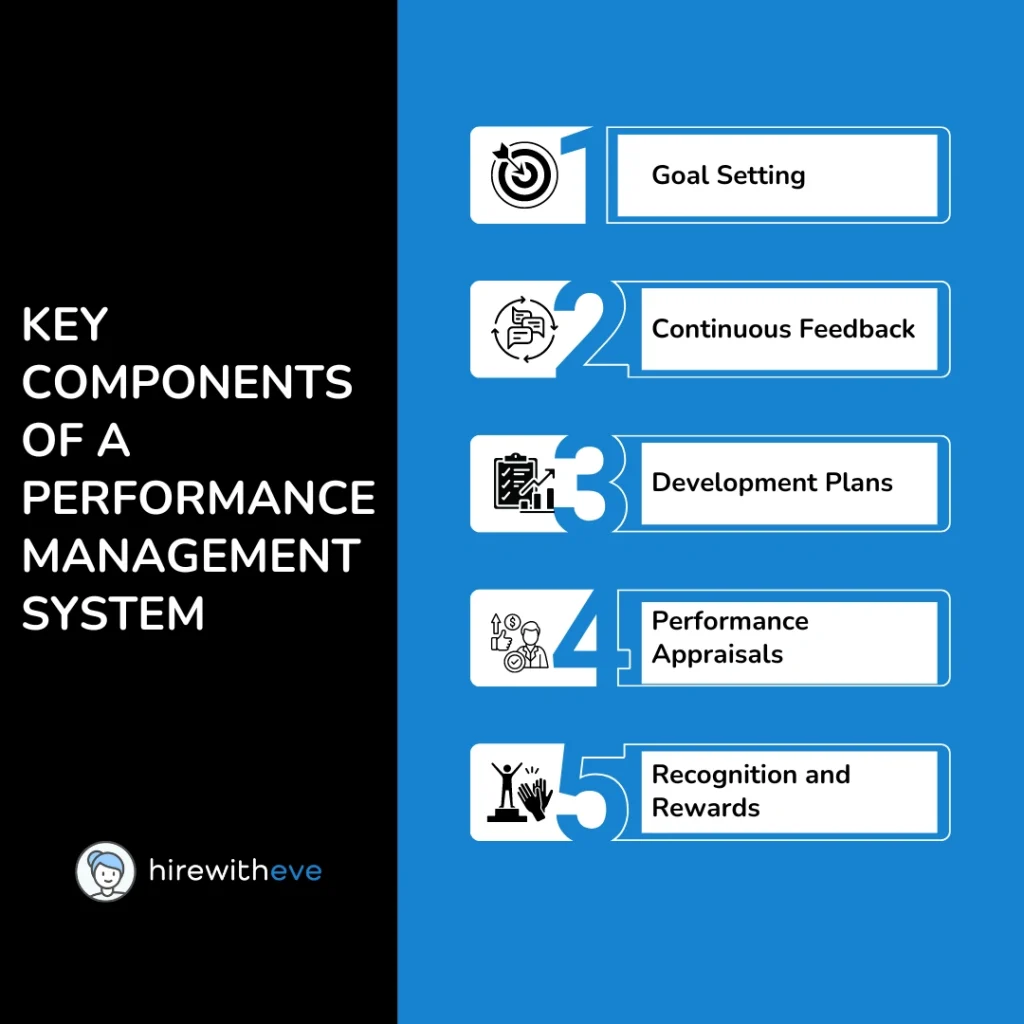What Is Performance Management? All You Need to Know

In today’s competitive business environment, performance management is more than just a buzzword. It is a strategic approach designed to improve employee performance, align individual goals with organizational objectives, and ensure continuous development.
For talent acquisition specialists and HR managers, understanding and implementing effective performance management practices is critical to fostering a culture of high performance and engagement within their organizations.
This blog will guide you through the essentials of performance management, why it’s important, and how you can implement it to ensure success within your teams.
What is Performance Management?
Performance management is a continuous process that involves setting expectations, monitoring progress, and providing feedback to ensure employees achieve their goals and contribute to the overall success of the organization.
It is an ongoing, systematic approach that helps HR managers and talent acquisition specialists measure, develop, and enhance employee performance.
Rather than relying solely on annual reviews, effective performance management engages employees in regular feedback sessions, goal-setting, and development discussions.
This comprehensive approach ensures that employees remain aligned with the company’s objectives, continuously improve their skills, and feel valued within the organization.
The Importance of Performance Management
Why is performance management essential? For one, it helps HR professionals and managers identify top performers, those who may need additional support, and areas where the organization can improve.
A structured performance management system can boost employee morale, increase productivity, and reduce turnover rates.
Here are a few key reasons why performance management is crucial:
Alignment with Business Goals: Through goal-setting and continuous feedback, performance management ensures employees are working toward achieving the company’s strategic objectives.
Employee Development: With consistent feedback and development opportunities, employees feel supported in their growth, leading to higher job satisfaction and engagement.
Enhanced Productivity: When employees have clear goals and receive regular feedback, they are more likely to stay motivated and focused on their tasks.
Retention of Top Talent: A solid performance management strategy encourages career development and fosters a sense of loyalty, which helps retain top-performing employees.
Key Components of a Performance Management System
To implement an effective performance management system, HR managers and talent acquisition specialists must consider several key components that drive successful outcomes.

Goal Setting: Setting clear, measurable goals is the foundation of any performance management system. These goals should be aligned with the organization’s objectives and broken down into achievable steps for employees.
Continuous Feedback: One of the core principles of performance management is ongoing communication. Regular check-ins, whether weekly, monthly, or quarterly, provide opportunities for feedback and help employees stay on track toward their goals.
Development Plans: Employees should have access to development opportunities that align with their career aspirations. Personalized development plans are critical to ensuring that employees continue to grow and develop in their roles.
Performance Appraisals: Formal performance reviews are still an essential part of performance management but should be combined with more frequent, informal feedback to provide a holistic view of an employee’s performance.
Recognition and Rewards: Recognizing employee achievements, both formally and informally, plays a vital role in maintaining engagement and motivation within the workforce. A successful performance management system incorporates recognition programs that reward outstanding performance.
Performance Management Trends and Data
Recent trends show a shift towards more holistic performance management approaches, incorporating real-time feedback, technology, and employee empowerment. According to a 2023 survey by McKinsey & Company, 67% of organizations that implemented continuous performance management reported higher employee satisfaction and improved productivity.
Best Practices for Implementing Performance Management
While the concept of performance management is straightforward, its implementation can be challenging without the right approach.
To ensure success, HR professionals should follow these best practices:
Create a Culture of Continuous Feedback: Encourage managers to provide ongoing feedback, fostering an environment where employees feel comfortable discussing their performance regularly.
Use Data to Drive Decisions: Leverage data analytics to track employee progress and make informed decisions about promotions, raises, and development opportunities.
Customize Your Approach: Every organization is different, and so are its employees. Tailor your performance management system to fit the unique needs of your organization, and ensure that it remains flexible enough to adapt as those needs evolve.
Involve Employees in the Process: Give employees a voice in setting their goals and creating their development plans. This involvement promotes ownership and accountability, which can lead to better performance outcomes.
Leverage Technology: Consider using tools and platforms that streamline performance management processes, such as goal tracking, feedback collection, and performance analytics. These tools can reduce the administrative burden and provide insights that drive better decision-making.
Conclusion
When it comes to optimizing your performance management processes, the right tools can make all the difference. HirewithEve.ai provides a range of features designed to help HR managers and talent acquisition specialists streamline their hiring and management strategies.
HirewithEve.ai enables organizations to integrate skills-based assessments into the hiring process, ensuring that new hires are equipped with the necessary skills to excel in their roles. This directly supports effective performance management by aligning employee skills with organizational goals from the outset.
Additionally, the platform offers powerful analytics and reporting tools, allowing HR professionals to track employee performance data over time and make data-driven decisions. By leveraging these insights, organizations can refine their performance management processes, recognize top performers, and provide targeted development opportunities for employees.
Incorporating HirewithEve.ai into your HR tech stack can help you build a more structured and efficient performance management system that drives long-term success for both employees and the organization.





